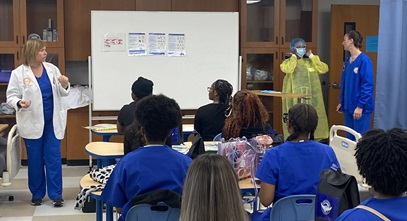Among the thousands of family nurse practitioners practicing across the US, day-to-day work varies greatly. According to the Bureau of Labor Statistics, the most common place for family nurse practitioners, or FNPs, to work is a physician's office. Others work in hospitals, outpatient care centers, walk-in clinics, or community and school healthcare facilities. Some FNPs start their own practices, while others chose to travel and work across the country.
If you’re not sure what’s right for you, here’s a close look at three of these diverse paths.
Family Nurse Practitioners in a Physician’s Offices
Family nurse practitioners in a physician's office typically work regular, set hours, which can provide a nice work-life balance. Because it is less hectic than a hospital or walk-in clinic, working in a private office can give you more time to focus on treating and educating each patient. You’re likely to get repeat patients, helping you to build close, trusting relationships. Here, you can expect both healthy patients and routine problems or concerns, but you’re unlikely to encounter a great diversity or severity of healthcare needs.
Because you’ll probably be part of a small staff, your relationship with your colleagues can play a big part in how much you enjoy your work. However, you should have relatively easy access to a physician when you need additional support or a consultation.
Practices Owned by Family Nurse Practitioners
Opening a practice on your own or jointly with another family nurse practitioner can be rewarding and offer increased autonomy, but it’s not without challenges and is best for someone with experience under their belt. Because the laws around operating a practice as an FNP vary by state, you’ll want to start by researching your state laws to see what’s possible.
To open a practice, you’ll need business acumen as well as financial know-how and resources. Alternatively, you could partner or seek advice and mentorship from someone more familiar with the logistics of running a business. You’ll also need to look into third-party reimbursement rates for FNPs and requirements around collaborative agreements with physicians, hospital privileges, and malpractice insurance.
On the upside of owning your own practice, you can make it a priority to build relationships with your patients and provide a quality of education and care you’re proud of. You’ll also set your own schedule, and, while being in charge of staffing isn’t easy, you’ll have full control over who your colleagues are. If you focus on a medically underserved population, starting your own practice can be particularly fruitful.
Traveling Family Nurse Practitioners
For those looking for adventure, a traveling family nurse practitioner career could be a great fit. These FNPs travel from city to city, filling temporary open FNP positions, staying in some roles for a few weeks and others for a year or more. This can be a fantastic opportunity to find out what positions and settings might be the right long-term fit for you. In addition to your compensation, most employers will cover your expenses for housing, travel, and insurance, and may help with making sure you have the right credentials to work in the state you’re considering.
Of course, for this job, you must be incredibly flexible and enjoy change—because from your patients to your colleagues to your home residence, change will be a constant part of your life. Each position will vary slightly, with different expectations and patient care needs. It’s possible that the experience could be isolating if you don’t make friends quickly, but, alternatively, you could end up with friends in every state!
Want to know more about career options and becoming a family nurse practitioner?
Explore our nurse practitioner articles on the blog, or contact us to talk about our graduate degree programs that can prepare you for a career in this field.
Sources for this article include Occupational Employment and Wages, May 2015, The Pros of Being a Nurse in a Doctor's Office, Open Your Own Nurse Practitioner Practice, and How to Become a Travel Nurse.
Programs, credential levels, technology, and scheduling options vary by school and are subject to change. Not all online programs are available to residents of all U.S. states. Administrative office: South University, 709 Mall Boulevard, Savannah, GA 31406-4805 © 2017 South University. All rights reserved. Our email address is materialsreview@southuniversity.edu.




